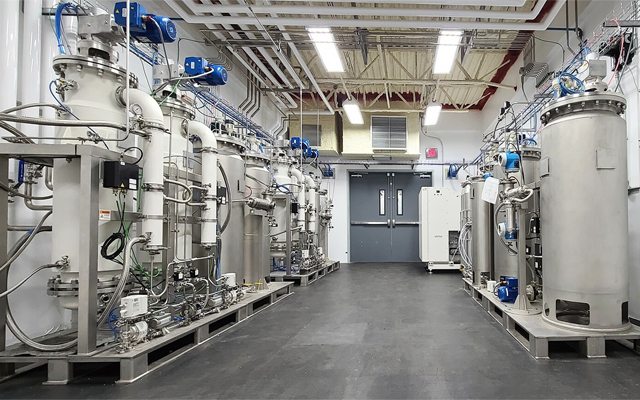The processing of hemp into specific cannabinoids, or minors, is becoming more and more common; however, the approach to this purification is costly and time-consuming. Many processors in the hemp space use chromatography equipment to purify the extracted hemp into isolated form for use in consumer and wellness products. While chromatography has remained the standard, few companies have made advancements to the process in terms of efficiency, sustainability, and the refining of additional COIs (compounds of interest) such as emerging cannabinoids. This type of innovation is exactly what two companies in the cannabis and hemp space are looking to accomplish.
RotaChrom, the developer of the world’s first industrial-scale Centrifugal Partition Chromatography (CPC) technology platform, announced this week that they have partnered with a Colorado based hemp processor to do just that. As they put it, they will work together on “methods development by sharing and optimizing existing methodologies as well as working to create new and profitable applications for using chromatography as a hemp processing solution” and “work together on developing processes for additional compounds of interest and new minors.” The Red Mesa facility where the collaboration is taking place is located in St. George, Utah and will also now serve as a reference facility for RotaChrom where potential customers and fellow processors can visit to view the equipment in action. The 50,000 square foot facility was built to ISO9001:2015 and cGMP standards and is designed for extraction, distillation, crystallization, and chromatography. The company stated that they have “worked to create an integrated infrastructure for processing industrial-scale premium CBD and other cannabinoids raw materials for the exclusive distribution to the B2B sector for formulating a multitude of consumer products.”
The hemp-derived, cannabinoid-based consumer product segment continues to skyrocket in interest, with new products emerging almost daily. Last year we saw a massive increase in interest in new minor cannabinoids such as CBN, CBG and Delta-8. Each of these cannabinoids require extensive processing from their natural source in order to reach purity levels required by the various regulatory bodies. As consumer demand for these products continues to increase, brands will be forced to adapt their products and find suppliers who can provide the necessary ingredients to make the products at the highest standard. While there are many known hemp processors in the space, the industry has been fraught with low-quality, inadequate raw ingredients, forcing brands to seek new supply chains in a seemingly “wild-west” type of market. Red Mesa, in collaboration with RotaChrom, hopes to address this issue by “setting the production processing standards” for the industry. President of Red Mess, Jeff Applegate, stated “We set out to be the global leader in cannabinoid processing, leveraging science and innovation, to create a truly unique integrated model for refinement of hemp-based ingredients. [When deciding to work with RotaChrom], the refinement and purity of higher value minors at scale and the ability to operate our processes consistently under the highest quality standards was paramount. Our focus was to secure a relationship with a partner that best complimented our team of talented chemists and researchers. With this view, we were confident that we had selected the best candidate in the field.”
It is clear that Red Mesa believes RotaChrom provided the right equipment to reach their vision. The Red Mesa facility now features an on-display, fully operational setup of RotaChrom’s industrial-scale Centrifugal Partition Chromatography platform, the pCPC, as well as a pilot sized rCPC and preparative sized iCPC. Adding the two additional components increases Red Mesa’s processing capacity by 10-fold and “results in a more purified botanical extract [produced] at a lower cost due to a reduction in steps and inputs required, as well as automation that decreases human capital and operating costs.”
The company also notes the environmental advantages of the system when compared to traditional chromatography and purification solutions. It states, “the platform creates significantly less environmental impact when compared to more traditional solutions as it uses two liquid phases, therefore no solid state waste occurs and solvents can be recycled up to 95%.” The environmental impact of hemp production has been an on-going conversation, specifically as it relates to the waste produced in the process. The companies share that they believe that the RotaChrom system is one of the most environmentally friendly chromatography solutions on the market due to its solvent recyclability.
What’s Next?
According to Danton Brown, Director of Technology & Engineering of Red Mesa, the companies have already made major breakthroughs in the processing of CBT and CBE and those are “just the beginning of a long runway for the refining of new minors and custom blends”.
Readers can learn more about the collaboration and solutions on the companies websites, RotaChrom Technologies and RedMesaScience.






